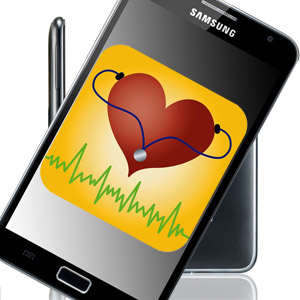 NEWS
NEWS
 NEWS
NEWS
 NEWS
NEWS
![]() Most of us use our smartphones to keep ourselves constantly connected with others. Some use it to pass time by enjoying games, reading e-books or even watching our favorite shows or movies. Some use it for work to remind them of meetings, have instant access to files, or set appointments. But did you know that one million smartphones would soon serve a different purpose?
Most of us use our smartphones to keep ourselves constantly connected with others. Some use it to pass time by enjoying games, reading e-books or even watching our favorite shows or movies. Some use it for work to remind them of meetings, have instant access to files, or set appointments. But did you know that one million smartphones would soon serve a different purpose?
Researchers at the University of California, San Francisco are recruiting one million participants that uses smartphones for the purpose of a decade-long heart study dubbed as Health eHeart which when read quickly sounds like healthy heart.
Smartphones, tablets and computer would be used to gather data from the participants. Apps will be downloaded and sensors such as the AlivCor will be worn to track vital statistics such as blood pressure and heart rate.
The study aims to identify what puts a person at risk for a heart attack since this is very unpredictable. Often you’d hear a person dying of a heart attack but you’d think that it was only a matter of time since he or she wasn’t living healthy. While in some instances, a person dies of a heart attack even if he lives healthily – no vices, exercises appropriately, enjoys outdoor activities and has a positive disposition. Then there are others who smoke like a chimney, eats a ton of bacon, and drinks alcohol everyday like there’s no tomorrow but manages to reach the ripe age of 80.
In perspective, this is a large-scale version of the Framingham Heart Study which was commission in 1948. IT recruited and studied 15,000 participants over three generations and required them to visit a doctor every two years to monitor their health. The study outlined health risk factors such as high blood pressure, high blood cholesterol, smoking, obesity, diabetes, stress, and physical inactivity as predisposing factors to having a heart attack and advised participants to lifestyle changes to avoid having one. By 2010, the study determined that a person who experienced a heart attack at the age of 65, his or her offspring is three times likely to also have a heart attack.
Some are skeptic about the study as they doubt that the technology is up for the challenge but the people behind Health eHeart believe that improvements in the technology will happen and that the huge volume of the participants will make up for the technology issues. Group selection is also pointed out as an issue since only those who own smartphones can participate in the study. Health eHeart will not provide smartphones to those who want to participate but do not own or cannot afford to buy their own smartphone.
Still, Health eHeart is positive that like most fitness trackers on smartphones, once people see that they need to improve their health, they will be motivated to alter their lifestyles. In the end, even if doctors do not tell unhealthy people to change their diet or be more active, they will because they want to see the numbers on their mobile apps improve.
Support our mission to keep content open and free by engaging with theCUBE community. Join theCUBE’s Alumni Trust Network, where technology leaders connect, share intelligence and create opportunities.
Founded by tech visionaries John Furrier and Dave Vellante, SiliconANGLE Media has built a dynamic ecosystem of industry-leading digital media brands that reach 15+ million elite tech professionals. Our new proprietary theCUBE AI Video Cloud is breaking ground in audience interaction, leveraging theCUBEai.com neural network to help technology companies make data-driven decisions and stay at the forefront of industry conversations.